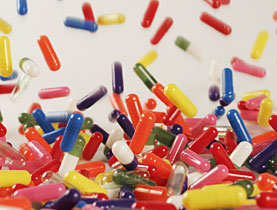
Prices on EU imports could drop

The Swiss government wants to lower the prices of goods arriving in the country from the European Union by eliminating technical barriers to trade.
It has asked parliament to consider introducing the “Cassis-de-Dijon” Principle – resulting in possible savings of more that SFr2 billion per year ($1.96 billion), according to the State Secretariat for Economic Affairs (Seco).
Currently, only 48 per cent of goods imported from the EU face no technical hurdles. If new federal legislation is adopted by parliament, that share will increase to more than 80 per cent.
Economics Minister Doris Leuthard said on Friday the proposed reform would have a much bigger impact than allowing parallel imports, a move recently rejected by parliament.
Consumer groups had been in favour of parallel imports given Switzerland’s reputation for high prices.
“Bringing down trade barriers will increase competition, lower the price of consumer products and cut production costs,” added Leuthard. “The reform reflects a reality – regulations in the EU are similar to Switzerland’s.”
Seco economists reckon that Gross Domestic Product would increase by half a point if the reform is adopted. Switzerland’s GDP in 2007 was SFr478 billion.
Leuthard said the proposed reform took into account both consumer interests and the need to open the Swiss market. She added that the sooner that is was implemented, the sooner consumers would feel the benefits.
Rules
The products whose prices will be affected are mainly cosmetics, textiles, clothing, food and furniture.
Another aspect is that products that have detrimental effects on the environment or people’s health will not be approved for sale in Switzerland .
Consumer information will be simplified and no longer have to be given in more than one of the national languages. However information concerning safety precautions and warnings will have to appear in the local language.
Special rules are planned for food items. For products prepared and sold in the EU, an import licence will only be granted if the Federal Health Office gives its authorisation.
Altogether, fewer than 20 types of product will not be affected by the reform, with authorities controlling imports of items such as alcohol and tobacco. Most of the exceptions cover health and environmental issues.
The Cassis principle will not be applied to products that require a special authorisation or registration, such as pharmaceuticals. But procedures for those products permitted for sale in the EU under similar conditions will be simplified.
The changes will only apply for imports.
But the authorities hope that guidelines such as those planned for food items will help protect Swiss producers. Companies will also be allowed to sell products prepared for the EU in Switzerland.
Reactions
Reactions to the planned reforms have generally been positive. The centre-right Radical Party welcomed a move which, it said in statement, would lead to lower prices. It added though that the domestic economy should not suffer from the changes.
The centre-right Christian Democrats said they were also satisfied that change was on the way after years of delays. They also welcomed the decision to limit the number of exceptions to the Cassis-de-Dijon principle.
Swiss consumers organisations were also jubilant, saying that the government had understood that a rapid opening of the market would only be successful if transparency and security were guaranteed.
The associations are particularly pleased that the government has maintained declarations of origin for food items. They also hailed the decision to introduce new legislation on product safety at the same time.
“Recent scandals involving toys and dangerous clothing have shown that opening markets must be accompanied by harmonisation and more stringent safety norms,” the organisations said in a statement.
swissinfo with agencies
The Cassis-de-Dijon Principle states that a product legally manufactured and marketed in one European Union member state may circulate freely in the other states.
Free trade can be impeded only if it can be demonstrated that a product represents a danger to public health.
The principle does not apply between Switzerland and the EU.
Some Swiss regulations that must be applied despite the Cassis-de-Dijon Principle:
– indication of alcohol levels for drinks containing sugar.
– ban on lead-based paints.
– packets of cigarettes and other tobacco products must mention the name of the maker or importer and the price in Swiss francs.
– security regulations for railways and cable cars.
– ban on phosphates in detergents (but no further obligation to label products in two national languages.)
– ban on battery hens.
– for food items, the country of production will still have to be mentioned, along with possible allergic substances.
– flammability of textiles will still be indicated.
– regulations for boilers, hot water tanks and chemical products.

In compliance with the JTI standards
More: SWI swissinfo.ch certified by the Journalism Trust Initiative






























You can find an overview of ongoing debates with our journalists here . Please join us!
If you want to start a conversation about a topic raised in this article or want to report factual errors, email us at english@swissinfo.ch.